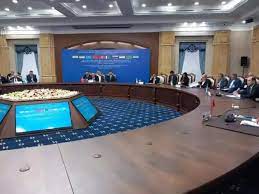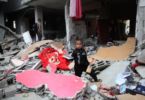The sixth annual meeting of Security Council secretaries of the Collective Security Treaty Organization (CSTO) nations on Afghanistan kicked off in Bishkek, Kyrgyzstan on Friday. During the meeting, Russian representative Nikolay Patrushev urged the session that the Collective Security Treaty Organization (CSTO) and the Shanghai Cooperation Organization (SCO) need to work out extra border security measures to counter threats animating from Afghanistan to neighboring countries.
According to senior Russian official, the unstable situation in Afghanistan demands necessary measures in advance to counter the export of instability to their countries. This problem can be resolved through multilateral comprehensive efforts, primarily, within the CSTO and the SCO architectures.
The Taliban-ruled Afghanistan is currently embattled with grave challenges relating to the Afghan economy, global diplomatic recognition, a lack of liquidity, absence of political inclusiveness together with the presence of transnational terrorist groups like the Tahreek-e-Taliban Pakistan (TTP), the ETIM, BLA and other terror outfits that enjoy safe havens, freedom of movement and conducive environment to flourish unhindered and implement their nefarious designs against foreign states in the region and beyond.
Meanwhile, the Islamic State Khorasan Province (ISKP), the Afghan chapter of Daesh expanding its network and gradually shaped into a grave security risk for the interim Afghan government along with prompting a real threat to other nations in the broader Indo-Subcontinent including Pakistan, India, Bangladesh, Maldives, and Sri Lanka who fear a rise in extremism and militancy in their countries. At the same time, this state of affairs and assembly of nonstate bad actors in Afghanistan alarmed Bell in Central Asian Republics, who share a common border with Afghanistan and face serious security risks regarding across-border terrorism, drug trafficking, and transnational organized crimes in their countries.
The recent Russia-led conference noted that Afghanistan has an important geographical position at the intersection of key trade routes linking European and Asian states. The development of Afghanistan as a peaceful, united, and independent state fulfills regional as well as global interests. The meeting discussed a broad range of measures requiring implementation in the sphere of border security, exchanging information on the activity of terrorist organizations and their supporters, identification and shut down of sources and channels of terrorism financing and drug trafficking through the relevant forums to augment collective efforts against the shared hazard.
Presently, Afghanistan’s neighbors from East to West and North to South have grave concerns regarding the concentration of transnational criminals and terrorist outfits in their neighborhood amid a lack of interest and incapacity of the Afghan government, which shatters the regional peace and stability in the region. Although, the Islamic Emirate of Afghanistan (IEA) repeatedly stated that no terrorist group exists there and Afghan soil will not be used against the security of neighboring countries. However, such flimsy media statements neither change the ground realities nor mitigate the risk of flourishing terrorism in that country.
The Afghan interim rulers have not yet accessed the severity of the problem and the gravity of the risk that confronts their country and undermines the security of other nations in the region. The uncontrolled armed militias and terror outfits not only undermine the writ of the Islamic Emirate but can pose a serious risk to its survival when their interests contradict each other. Whilst, this situation is a persistent hazard to global peace and stability. There is a dire need for teamwork and cooperation with the Afghan government in counter-terrorism domain to effectively tackle this common threat, otherwise, no one can guarantee peace and stability in this region in the future.







